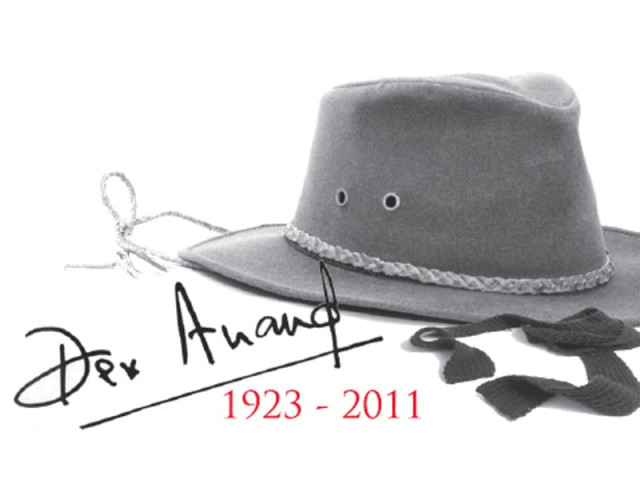Bollywood charmer: Dev Anand’s romance with life cut short
Indian actor dies suffering massive cardiac attack at age 88.

Fans of Dev Anand, Bollywood’s guru of romance, woke up on Sunday to learn of his death from a cardiac arrest in London. He was 88.
Evergreen, debonair, urbane and classy are words that were mostly associated with him during his film career that spanned almost 60 years. In his illustrious career, he worked in a number of beautiful films, mostly romantic, and is known for the melodious songs that he appeared in.
Anand’s life and work has inspired many in Pakistan.
“When I started my career, there were three people we looked up to, Dilip Kumar, Raj Kapoor and, of course, Dev Anand,” recalls Lollywood stalwart Nadeem Baig. “He played a long innings and that too in style, something that every actor would want to achieve.”
“The most significant thing about him was that he was not a Kapoor, Khanna, Khan or Kumar but just himself, an innovative person who refused to retire until his death,” says veteran actor Javed Shaikh.
It is only natural that the book on his life – which he insisted on authoring himself – is titled Romancing With Life. In 2007, Indian Prime Minister Manmohan Singh released the book, which is a no-holds-barred account of the life of a man who struggled with life and love to eventually become a larger-than-life superstar.
The book recounts Anand’s youth in the 1930s in Gurdaspur and Lahore, where he was student at the famous Government College (now known as Government College University). After graduating with a degree in English literature, he travelled to Bombay to join his older brother Chetan.
Initial years in 1940s Bombay were tough. Anand worked for a short while in the Military Censor’s Office, reading soldiers’ letters to their families, before film production company Prabhat Studio finally gave him his first break in the film Hum Ek Hain. His first salary was Rs350, a decent amount at the time.
A few years later, Chetan cast Anand in his first film Neecha Nagar, which dealt with the issue of slum dwellers protesting against toxic waste dumped in their colony and the behaviour of corrupt municipal officers. This film won a prize at the renowned Cannes Film Festival.
Around that time, he met leading singer and film heroine Suraiya in Bombay. They passionately fell in love with each other and while Suraiya’s mother approved the marriage, her grandmother vetoed it and Suraiya decided to part ways with him. Anand went home and cried on brother Chetan’s shoulders. Eventually, Anand married co-star Kalpana Kartik in 1954 but Suraiya remained single all her life.
The heartbreak made Anand turn to his work even more seriously. He decided to drown his sorrows in work and starred in Ziddi opposite Kamini Kaushal. The film was a massive success and placed Anand among Bombay’s leading heroes. His first hit colour film was the 1960s runaway hit Guide with Waheeda Rehman. But despite all his popularity, Anand was very close to his two competitors – Dilip Kumar and Raj Kapoor.
Anand won scores of awards, including a number of lifetime achievement awards in recent years. The government of India honoured him with its prestigious civilian award Padma Bhushan in 2001 and the Dadasaheb Phalke Award in 2002, the highest award for contribution to film.
Anand’s last contribution to Indian cinema was the film Chargesheet which was released in 2011. He is survived by a widow and two children, as well as hundreds of beautiful songs and the legacy of romance that he has left behind.
His youthful demeanour has made him an icon even for people too young to have seen him in his days of glory. “I feel lucky that I went to the same college as Dev Anand sahib,” tweeted pop singer and actor Ali Zafar. “I remember when my mother made me watch the movie Guide. I spent the next week trying to puff my hair as high as his,” he later told The Express Tribune.
(With additional reporting by Aditi Phadnis in New Delhi)
Published in The Express Tribune, December 5th, 2011.












1724319076-0/Untitled-design-(5)1724319076-0-208x130.webp)






COMMENTS
Comments are moderated and generally will be posted if they are on-topic and not abusive.
For more information, please see our Comments FAQ